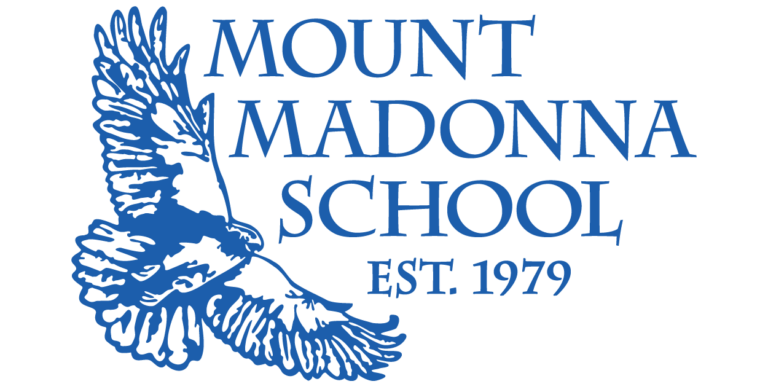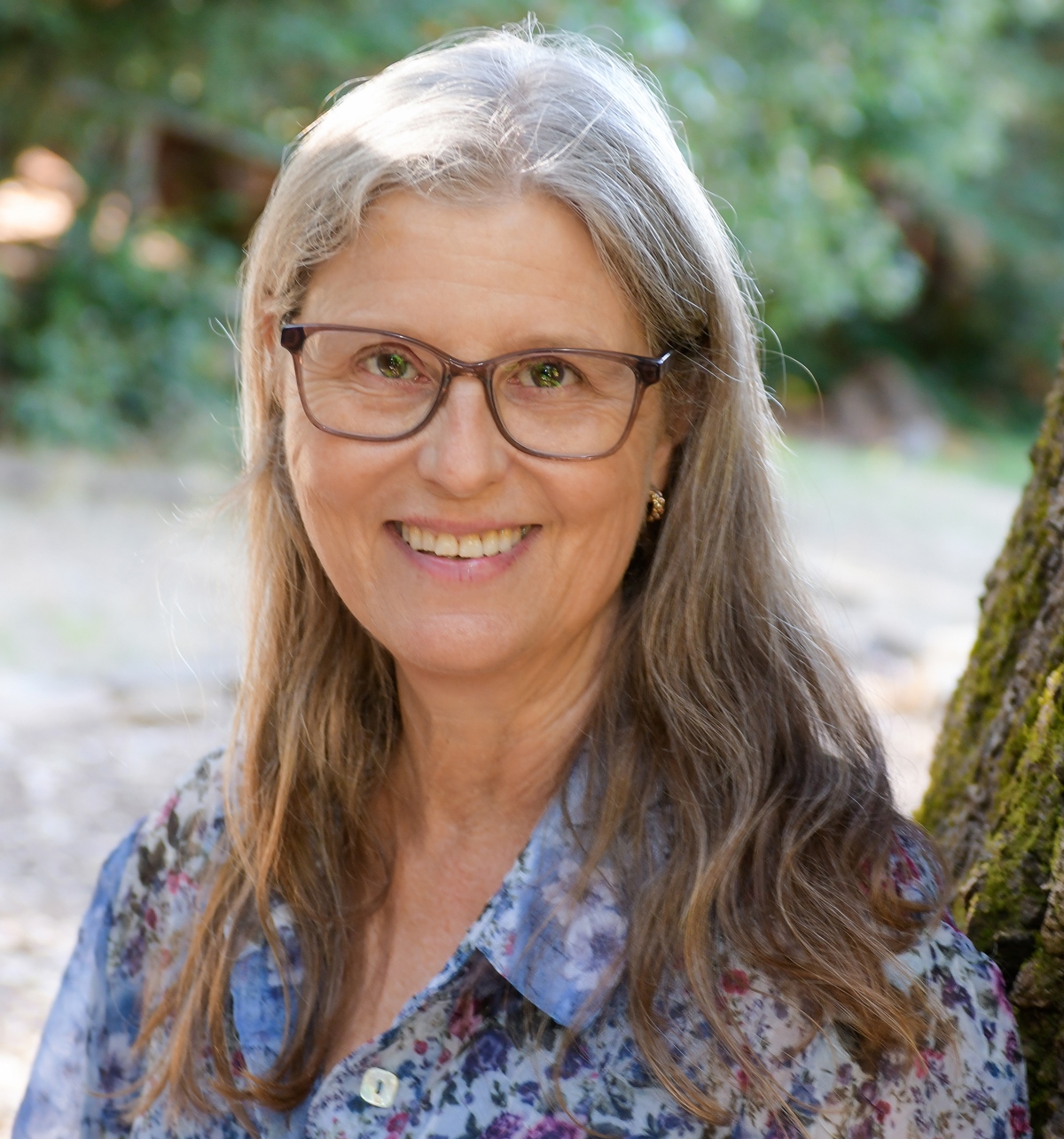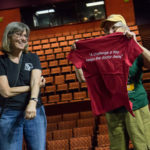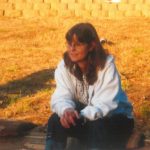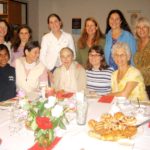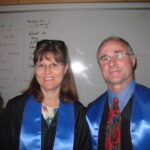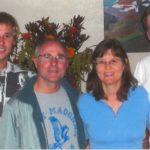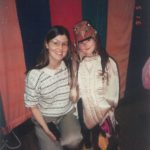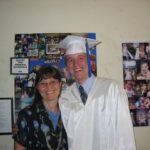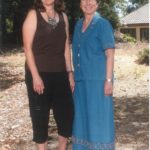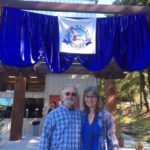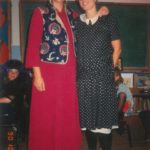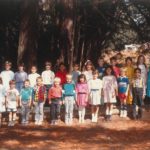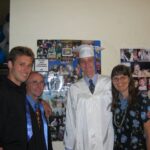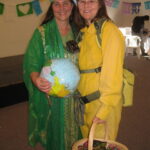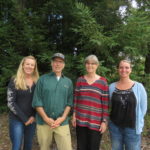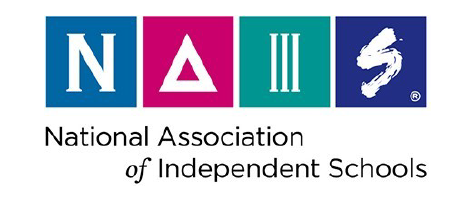 Mary Supriya McDonald, teacher and head of school, joined Mount Madonna School in 1987 and is retiring at the end of the current school year. Alumna Haley Campbell (’02) spoke with McDonald in December 2019, and shares this revealing profile.
Mary Supriya McDonald, teacher and head of school, joined Mount Madonna School in 1987 and is retiring at the end of the current school year. Alumna Haley Campbell (’02) spoke with McDonald in December 2019, and shares this revealing profile.
It was a rainy morning in May 1981. Supriya and Sidd bundled up baby Ramesh and drove from their home in Everett, Washington, to the Sea-Tac airport. Sidd had seen an announcement on the board in the Seattle food co-op they went to every weekend to get supplies: Baba Hari Dass was flying from the Bay Area to Salt Spring Island, with a layover in Seattle, and he would be offering darshan (presence and blessing from a spiritual teacher) in a beautiful little chapel at the airport.
Settled into the chapel, visitors were encouraged to ask questions of Baba Hari Dass, or “Babaji” as he was respectfully known to his students. Supriya said, “I am a school teacher. What do you believe is most important for children’s education?”
 Babaji wrote his response on his chalkboard. She remembers he said something like, “Children watch what adults do, not what they say.” Supriya took this to mean that modeling positive qualities is essential for teachers and parents.
Babaji wrote his response on his chalkboard. She remembers he said something like, “Children watch what adults do, not what they say.” Supriya took this to mean that modeling positive qualities is essential for teachers and parents.
When the meditation was about to begin, a dark-haired woman with two young boys approached Supriya saying, “Do you want me to take your baby, so that you can meditate? I get the opportunity to meditate with Babaji regularly and I know you don’t.” She indicated an older woman with short hair and thick glasses and said, “We’re going to go get french fries for my boys.”
“And I gave my baby to someone I didn’t know in the Sea-Tac International Airport!” Supriya recalls. “Remarkably, I had no worries at all about it, and I sat and meditated with Babaji. That was the depth of safety I felt. That was my first meeting with Sarada Diffenbaugh and Ma Renu. I trusted them implicitly with my child. Ramesh went off with his older brothers-to-be, Suresh and PK Diffenbaugh.” It was the beginning of Supriya’s long relationship with Babaji, his teachings and the projects he inspired.
Supriya comes from a line of teachers — her grandmother, mother, and several of her cousins are teachers — but it was not always Supriya’s plan to become a teacher. In high school, with a book from her local Huron, Ohio, bookstore, she studied yoga and dreamt of becoming a physical therapist, perhaps minoring in child psychology. However, the more she progressed in her studies, the more she realized that teaching would allow her to learn from multiple disciplines and have summers off to continue nourishing her love of hiking and camping in the  wilderness. Supriya graduated high school valedictorian in 1973. During her senior year, she had attended Bowling Green State University’s extension program as she had finished her credits early. Upon graduation, she attended Ohio University, then transferred to Northwestern University in Illinois, and then to Western Washington University (WWU) in Bellingham, Washington, which she had discovered while reading The Underground Guide to the College of Your Choice.
wilderness. Supriya graduated high school valedictorian in 1973. During her senior year, she had attended Bowling Green State University’s extension program as she had finished her credits early. Upon graduation, she attended Ohio University, then transferred to Northwestern University in Illinois, and then to Western Washington University (WWU) in Bellingham, Washington, which she had discovered while reading The Underground Guide to the College of Your Choice.
At the time WWU was a state teacher’s college on the northernmost coast of the Pacific Northwest, sharing land, history, and connection with the Lummi tribe, the original inhabitants of the region, and other Native American tribes. Supriya went for a summer and fell in love with the school and the area, which offered access to nature and anthropological study, two of Supriya’s great passions. During her time there, she studied field biology and geology and hiked the Cascades. She spent a quarter abroad in southern Mexico where she studied Mayan, Toltec, and Aztec temples and visited local village schools. When she returned to Washington, she was able to use the Spanish she had learned when she was placed in an agricultural community to complete her student teaching.
Supriya graduated with a Bachelor of Arts in elementary education and a minor in ethnic studies. “I ended up graduating with so many credits that when I transferred my credential to California state, I didn’t have to take the NTE (National Teacher Exam) because I had enough credits in every major discipline. I never could decide which subject to focus on, which is why I chose elementary education because you can teach every subject.” Supriya went on to the University of Washington’s graduate education fifth-year program where she earned a Washington State Lifetime teaching credential valid for preschool to adults.
 In 1977, while teaching kindergarten in Seattle, Supriya moved into a beautiful grand home near the university shared with 10 people. One of her new housemates was Sidd McDonald.
In 1977, while teaching kindergarten in Seattle, Supriya moved into a beautiful grand home near the university shared with 10 people. One of her new housemates was Sidd McDonald.
Supriya taught kindergarten in a private school in Seattle called Rainbow Valley and then went on to teach second and third grades at Sunnyside Elementary in the Marysville Unified School District for nine years. “I learned to teach at Sunnyside, I would say. The first year I team-taught with two very experienced teachers. I loved learning from my co-teachers.” One of her favorite projects during that time was partnering with the fifth grade teacher and leading the school’s Adopt-a-Stream program, in which they raised salmon fry in the school library in order to rehabilitate a local stream in a cow pasture.
They married on January 8, 1980, in Snohomish, Washington, during a snowstorm so great that only the preacher, his wife, and their child were in attendance. The following summer Supriya and Sidd had a wedding with their families. They purchased a house in Everett, and their first child, Kai Ramesh, was born March 12, 1981.
 After meeting Babaji and his early students, Sidd traveled to Mount Madonna Center (MMC) to complete the Yoga Teacher Training in December of 1981. Unfortunately baby Ramesh was hospitalized from E. coli poisoning from poorly packaged tofu, and Sidd had to fly home. The following spring, they received a letter from Babaji, asking them to come down to MMC and help rebuild the Community Building, which had burned down. Sadanand Mailliard called to follow up on Babaji’s letter. At the time, Sidd was a plumber and could be of service. Supriya, Sidd, and one-year-old Ramesh traveled to MMC during spring break. Supriya recollects, “It was one of those terrible years where it was just stormy, stormy, stormy.” They returned that summer to work, and over the next several years, they would attend many retreats at both MMC and the Salt Spring Centre of Yoga in British Columbia.
After meeting Babaji and his early students, Sidd traveled to Mount Madonna Center (MMC) to complete the Yoga Teacher Training in December of 1981. Unfortunately baby Ramesh was hospitalized from E. coli poisoning from poorly packaged tofu, and Sidd had to fly home. The following spring, they received a letter from Babaji, asking them to come down to MMC and help rebuild the Community Building, which had burned down. Sadanand Mailliard called to follow up on Babaji’s letter. At the time, Sidd was a plumber and could be of service. Supriya, Sidd, and one-year-old Ramesh traveled to MMC during spring break. Supriya recollects, “It was one of those terrible years where it was just stormy, stormy, stormy.” They returned that summer to work, and over the next several years, they would attend many retreats at both MMC and the Salt Spring Centre of Yoga in British Columbia.
Supriya remembers one afternoon that first summer. The community was playing volleyball at the sand courts. Supriya walked by Kaya Kalpa Wellness Center and passed Babaji on the way. She informed him that they couldn’t stay through the whole summer because her family was hosting a big reunion in Illinois. On his chalkboard, Babaji wrote, “You will be back.” He underlined the words several times for emphasis. Supriya wasn’t sure if it was a question or a prediction.
 In 1985, on Salt Spring Island, Supriya said to Babaji, “I’m really fine having one child, but do you think I should have two?” Babaji burst out laughing. “Have two!” It turned out that Supriya was already pregnant and did not know it yet. “To this day I think he knew I was pregnant before I did.” PK was born January 25, 1986.
In 1985, on Salt Spring Island, Supriya said to Babaji, “I’m really fine having one child, but do you think I should have two?” Babaji burst out laughing. “Have two!” It turned out that Supriya was already pregnant and did not know it yet. “To this day I think he knew I was pregnant before I did.” PK was born January 25, 1986.
A couple years later, back on Salt Spring Island, Babaji told Supriya that there was a teaching position open at Mount Madonna School (MMS), and she should apply. She sent her resume and flew down alone for an interview during spring break. She was offered the job in June, 1987. They filled their little yellow Toyota truck with Supriya’s teaching supplies, clothes for the kids, and some toys. Sidd helped them move into the Sewing Shed cabin across from the lake, and then he drove back to Washington. He was still a few months away from earning his degree in electrical engineering, and they owned a house. “Nothing was planned out,” Supriya said. Sidd would join them once he had tied up the loose ends of their lives in Washington. “I have a sense that in all my life decisions, I don’t plan for them as much as allow space for them to happen. So, like my decision to come to Mount Madonna, I didn’t plan to come as much as I just tried different things, and then the door opened.”
 Supriya and Sidd’s new home at MMC had once been a fruit stand on Highway 152. The owner offered the structure to MMC if it could be dismantled and moved. It originally had only three and one-half sides. When Sidd and Supriya moved in you could see through the wall that faced the ocean, Sidd put roofing shingles on the wall so that the wind wouldn’t blow through. That fall, Supriya started teaching in the first, second, and third grade combined class. Anupama Forson taught with her until noon, and then Supriya was on her own. Ramesh was in first grade but PK was too little to be in school, so he was brought down the road to Linda Waite’s house every day. She watched four toddlers in her home, including her son Elliot Waite (‘03), Kusum Forson (‘03, non-MMS graduate), and PK McDonald.
Supriya and Sidd’s new home at MMC had once been a fruit stand on Highway 152. The owner offered the structure to MMC if it could be dismantled and moved. It originally had only three and one-half sides. When Sidd and Supriya moved in you could see through the wall that faced the ocean, Sidd put roofing shingles on the wall so that the wind wouldn’t blow through. That fall, Supriya started teaching in the first, second, and third grade combined class. Anupama Forson taught with her until noon, and then Supriya was on her own. Ramesh was in first grade but PK was too little to be in school, so he was brought down the road to Linda Waite’s house every day. She watched four toddlers in her home, including her son Elliot Waite (‘03), Kusum Forson (‘03, non-MMS graduate), and PK McDonald.
In the beginning of MMS, everything was done by the teachers. The faculty retreat before school allowed time for teachers to clean, paint, and repair their own classrooms. “We built playgrounds; we worked with donated supplies and donated labor,” Supriya remembers. Eventually parent volunteers started helping teachers to clean their classrooms each week, giving teachers more time to focus on the students and curriculum planning. “Everybody worked together to make whatever we wanted for the children. It was always the children first.”
That winter it was so cold, and their house just had an old smoky wood stove and no insulation. Supriya had to gather wood and kindling. Little PK came down with pneumonia, so it was a big relief when Sidd was able to join them. With his degree complete, he started working as an electrical engineer for Mitsubishi, where he remained for sixteen years.
 Supriya settled into the school year and bonded deeply with her fellow teachers, especially Hamsa Heinrich, who started at MMS the same year. The following year they would become team-teachers for the first and second grade, a partnership that lasted a long time. “Hamsa is a dear colleague whom I taught with for many, many years. That collegiality and support keeps you sane when things are falling apart… It’s nice to have a trusted friend [to work alongside].”
Supriya settled into the school year and bonded deeply with her fellow teachers, especially Hamsa Heinrich, who started at MMS the same year. The following year they would become team-teachers for the first and second grade, a partnership that lasted a long time. “Hamsa is a dear colleague whom I taught with for many, many years. That collegiality and support keeps you sane when things are falling apart… It’s nice to have a trusted friend [to work alongside].”
One day during her first year Supriya was told, “Oh, by the way, just so you know, we do a camping trip together in May to Yosemite.”
“What do you mean, ‘we’?” She asked. “We’re taking first graders away from their parents for a week?! They still wet the bed!”
“Oh, yeah we’ve been doing it for years. It’s great!”
 Supriya remembers feeling surprised about that. Fifth grade teacher Sri Gyan McCaughan led the charge, and while it always seemed crazy to imagine bringing an entire elementary school to Yosemite for five days with only parents and teachers, the annual trip became a favorite MMS tradition for Supriya. “As much as I came back completely sleep-deprived from taking little children camping, honestly, it was so much fun to do outdoor wilderness trips with the students. I was glad my children had that experience.” (The author of this article remembers being one of Supriya’s first grade students on the camping trip in 1991, and PK, two years my junior, was in a pack on Supriya’s back through most of that trip.)
Supriya remembers feeling surprised about that. Fifth grade teacher Sri Gyan McCaughan led the charge, and while it always seemed crazy to imagine bringing an entire elementary school to Yosemite for five days with only parents and teachers, the annual trip became a favorite MMS tradition for Supriya. “As much as I came back completely sleep-deprived from taking little children camping, honestly, it was so much fun to do outdoor wilderness trips with the students. I was glad my children had that experience.” (The author of this article remembers being one of Supriya’s first grade students on the camping trip in 1991, and PK, two years my junior, was in a pack on Supriya’s back through most of that trip.)
Supriya and Sidd moved into the tiny little cabin next to the Farmhouse, which was better insulated than the Sewing Shed. They spent four years there. Supriya thought of it as, “the hobbit hole.” When the Loma Prieta earthquake struck on October 17, 1989, Supriya had zipped to town for a quick errand, leaving her house full of children from the land, who had all packed into the small space to play together. “I told some of the adults here to look in on the children,” Supriya recalls, “and while I was gone, the whole place went up and came right back down on its foundation. The children were all in there together. They were fine!”
 In the summer of 1991, Supriya and Sidd began building their current home near the Newt Pond. Like most projects at MMC, it was a community effort. “Sidd did plumbing at night after working all day in San Jose, and on the weekends. I sanded and painted beams, cabinets, walls, window frames, etc. after teaching all day and on the weekends. We hired Dave, Lila, and Rajesh Ansell to build the house, and Bhairab Lazar did the electric and tile.”
In the summer of 1991, Supriya and Sidd began building their current home near the Newt Pond. Like most projects at MMC, it was a community effort. “Sidd did plumbing at night after working all day in San Jose, and on the weekends. I sanded and painted beams, cabinets, walls, window frames, etc. after teaching all day and on the weekends. We hired Dave, Lila, and Rajesh Ansell to build the house, and Bhairab Lazar did the electric and tile.”
For many years, Supriya was a certified mentor teacher, which meant that she welcomed student teachers into her classroom, guiding several professionally and helping them learn-by-doing to complete their credential programs. “I think I have always had an internal desire to teach and to learn, and I love studying about anything and everything, so it was easy to be in the classroom. My curriculum was never the same year to year. I always had to look at something new, do something different, and keep it fresh for me and the students.” Over the years, Supriya’s responsibilities at MMS grew. She began collecting tasks outside teaching, and eventually she requested time be set aside to accomplish these additional tasks. In 2004, she was given the title of elementary director. She still taught in the mornings, and in the afternoons, she worked on admissions, Western Association of Schools and Colleges (WASC) accreditation, teacher professional development, and specialist scheduling.
 When Sarada Diffenbaugh, Supriya’s dear mentor, announced her retirement as head of school, the role was divided between Supriya (lower school head) and Jivanti Rutansky (upper school head) in the fall of 2007. Supriya took on more responsibilities, including expanding fundraising. “In those days, the students had to raise money for the trips to happen, which meant that the teachers had to organize for their students to raise money for the trips to happen.” They raised money for the camping supplies, they sold T-shirts to support the Ramayana!, and they participated in the Human Race Walkathon and Fun Run to raise money for other activities.
When Sarada Diffenbaugh, Supriya’s dear mentor, announced her retirement as head of school, the role was divided between Supriya (lower school head) and Jivanti Rutansky (upper school head) in the fall of 2007. Supriya took on more responsibilities, including expanding fundraising. “In those days, the students had to raise money for the trips to happen, which meant that the teachers had to organize for their students to raise money for the trips to happen.” They raised money for the camping supplies, they sold T-shirts to support the Ramayana!, and they participated in the Human Race Walkathon and Fun Run to raise money for other activities.
In 2015, Supriya became the single head of school, and Jivanti became the high school director before her retirement in 2016. “I never chose to become head. I said ‘no’ several times.” But she eventually agreed. “The people who say ‘no’ to leadership are often the ones you can trust to be good leaders, sometimes more than those who are ambitious for leadership positions,” reflected Supriya. “I think for the administrative aspect of my job, I have a very logical, organized way of thinking about things, rallying to get jobs done, and simply a natural doggedness to stick with something until it’s done. These are good qualities for administrators, because it doesn’t come to administrators if it isn’t a problem. Normally I really like untangling problems.”
 Supriya continued to teach health to the fifth graders for many years because, despite her growing responsibilities; she believes it is essential that school leadership remain involved in the classroom.
Supriya continued to teach health to the fifth graders for many years because, despite her growing responsibilities; she believes it is essential that school leadership remain involved in the classroom.
A karma yoga practitioner (one who practices selfless service), Supriya lives by a clear sense of values. “I do what is needed,” she explains. “I think it started really early in my upbringing. Probably watching my grandmother, watching my mother, and watching my aunts and farm relatives whom I’m really quite close with, all really good people who help others. It’s just what you do. Some people when they meet me say, ‘Oh, I can tell you’re from the Midwest!’ It’s the upbringing in a small Midwest town where you just help people; that’s the definition of community. There’s a familiarity about that upbringing. There are so many people here at MMC and MMS who are like that. I think that’s what draws people here honestly: to find a community of support that’s willing to work together around hard issues.”
Through the years Supriya has been continuously astounded at what a community of support can accomplish together. “It’s really quite inspiring that the school has survived for over 40 years. It isn’t the fundraising; it’s the dedication of service that so many volunteers have given time and time again. The Ramayana! is such a big push. I dread it going into it; I know it’s going to demand so much of each of us, and at the end of it, people are shiny and sparkly. Whatever we push through — graduations, field trips, hosting athletic events, the Creative Writing Reading — we grow from. Hearing students’ reflections, what they have experienced and learned and how they’re applying it, it’s validation. All the little problems of the day melt away, and it is clear, ‘That’s why I’m doing this’.”
 Supriya believes that education is just about the most important job that somebody can do. “I think there are a lot of important jobs, but for me, it was a simple decision that this was how I would spend my time. I can get inspired just going to the bus stop; that’s why I still go to the bus stop in the morning. Just seeing the children, they come in like open books, really fresh. They don’t hold onto things; they’re pretty open to trying new things. The goal is trying to keep that spirit alive all the way through into their adult lives.”
Supriya believes that education is just about the most important job that somebody can do. “I think there are a lot of important jobs, but for me, it was a simple decision that this was how I would spend my time. I can get inspired just going to the bus stop; that’s why I still go to the bus stop in the morning. Just seeing the children, they come in like open books, really fresh. They don’t hold onto things; they’re pretty open to trying new things. The goal is trying to keep that spirit alive all the way through into their adult lives.”
Being a school administrator can be an exhausting and lonely job. “It’s a very delicate dance to make decisions and stay in balanced and positive relationships with others who may not agree with your decisions. I think in any occupation, when you’re learning what that occupation is, it’s good to find people who do the job well and watch them. Whether it’s carpentry, teaching or administrating schools, look at what and how they’re doing it, and then apply that.”
Supriya likes problem-solving in a positive environment with people working together collaboratively as a team. “Creating an environment that feels safe for people to give ideas, take risks, show friendliness, kindness. Trying to do what Babaji told me the very first time I met him: Model the kind of person you want the children to see and to be. For me, I think the dedication to helping the next generation get the skill sets they’ll need or the attitude — I think it’s really about growing a mindset of positivity, caring, understanding and forgiveness. Everybody gives it their best shot, but everybody makes mistakes. I think showing children how we recover from our mistakes is really important.”
 Supriya works at least 60 hours a week. Every morning she looks at her phone between 6:30 and 7:00am to see if the buses are going or not. If for some reason, they are not, the situation requires quite a bit of problem solving. She starts emails every morning at 7:30am, an hour before going to breakfast. “If I don’t do that, I’m way behind for the day.” After breakfast she goes to the elementary bus stop to check in with elementary teachers, parents, and students. Then she goes to the upper campus working all day with her team to set direction and fulfill mission, and meeting with various stakeholders. Once everyone goes home, she often has meetings with Business Manager Eric Forbes about finance or catches up on communications. “Then at night people call me and of course there are evening meetings. It’s not unusual for a head to have that much going on and that much responsibility.”
Supriya works at least 60 hours a week. Every morning she looks at her phone between 6:30 and 7:00am to see if the buses are going or not. If for some reason, they are not, the situation requires quite a bit of problem solving. She starts emails every morning at 7:30am, an hour before going to breakfast. “If I don’t do that, I’m way behind for the day.” After breakfast she goes to the elementary bus stop to check in with elementary teachers, parents, and students. Then she goes to the upper campus working all day with her team to set direction and fulfill mission, and meeting with various stakeholders. Once everyone goes home, she often has meetings with Business Manager Eric Forbes about finance or catches up on communications. “Then at night people call me and of course there are evening meetings. It’s not unusual for a head to have that much going on and that much responsibility.”
Supriya feels confident about moving into retirement because of the devoted staff, faculty and greater community that constitute and support Mount Madonna School. “I know that everybody in the office now really knows their job, their position, their responsibilities, and they’re working together very smoothly as a support staff. I can say the same about the wonderful and dedicated MMS faculty of  exceptional educators who are working collegially to give their gifts and inspire the students. The greater community of parents, alumni and Mount Madonna continue to value and support MMS and its unique educational offerings. MMS is a special school and people sacrificed so much to build this place. It continues to be a sacrifice to be here, a huge austerity. We want to sustain the mission and values. And we need to create a right livelihood for everybody; that is another important goal. Of course, I don’t know what the future is going to bring. I’m just hoping and praying that by continuing to live the positive values that we share, whatever is needed is going to manifest for MMS and for the individuals who make up our community.”
exceptional educators who are working collegially to give their gifts and inspire the students. The greater community of parents, alumni and Mount Madonna continue to value and support MMS and its unique educational offerings. MMS is a special school and people sacrificed so much to build this place. It continues to be a sacrifice to be here, a huge austerity. We want to sustain the mission and values. And we need to create a right livelihood for everybody; that is another important goal. Of course, I don’t know what the future is going to bring. I’m just hoping and praying that by continuing to live the positive values that we share, whatever is needed is going to manifest for MMS and for the individuals who make up our community.”
Supriya will begin her retirement in the fall. “The first thing I want to do is slow down and also let myself be useful. Certainly I have to be useful, but at the same time, I want to have a year without major responsibility. I want to be able to wake up in the morning without adrenaline going through my veins, without wondering if the buses are going to roll.”
 Supriya wants to travel the country in her and Sidd’s truck camper and maybe drive to Alaska. She wants to see the world; she wants to fill her life with more music, more writing, and more walks.
Supriya wants to travel the country in her and Sidd’s truck camper and maybe drive to Alaska. She wants to see the world; she wants to fill her life with more music, more writing, and more walks.
“Going to see live music is the great escape now for me. I had a banjo once; I don’t know if I would do that again. Also, my mother was a concert pianist with a master’s degree in music. I have her piano, but I never make time to play.”
Supriya has been an integral part of the school’s story thus far. Her devotion to the community, her integrity and commitment to right practices, and her ability to listen and hold space have contributed to the strong foundational values of MMS. May we continue to work together to model the attitude, the mindset, and the understanding needed to achieve something for the common good. “There is so much the world needs, and it doesn’t matter where you are, and it doesn’t matter how big a splash you make, I think day-to-day simple kindness goes a long way.”
###
Contact: Leigh Ann Clifton, director of marketing & communications,
Nestled among the redwoods on 375 acres, Mount Madonna School (MMS) is a community of learners dedicated to creative, intellectual, and ethical growth. MMS supports its students in becoming caring, self-aware, discerning and articulate individuals; and believe a fulfilling life includes personal accomplishments, meaningful relationships and service to society. The CAIS and WASC accredited program emphasizes academic excellence, creative self-expression and positive character development. Located on Summit Road between Gilroy and Watsonville. Founded in 1979.
